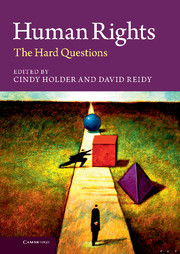Book contents
- Frontmatter
- Contents
- Figure
- List of table
- Notes on contributors
- Introduction
- Part I What are human rights?
- Part II How do human rights relate to group rights and culture?
- Part III What do human rights require of the global economy?
- Part IV How do human rights relate to environmental policy?
- Part V Is there a human right to democracy?
- Part VI What are the limits of rights enforcement?
- Part VII Are human rights progressive?
- 21 Moral progress and human rights
- 22 Human rights and moral agency
- 23 Gender mainstreaming human rights
- Afterword Rights, practice, reality and hope
- Index
- References
Afterword - Rights, practice, reality and hope
Hard questions about human rights
Published online by Cambridge University Press: 05 May 2013
- Frontmatter
- Contents
- Figure
- List of table
- Notes on contributors
- Introduction
- Part I What are human rights?
- Part II How do human rights relate to group rights and culture?
- Part III What do human rights require of the global economy?
- Part IV How do human rights relate to environmental policy?
- Part V Is there a human right to democracy?
- Part VI What are the limits of rights enforcement?
- Part VII Are human rights progressive?
- 21 Moral progress and human rights
- 22 Human rights and moral agency
- 23 Gender mainstreaming human rights
- Afterword Rights, practice, reality and hope
- Index
- References
Summary
When we set out to put together this volume, we conceived of it as organized around a series of hard questions about human rights, increasingly familiar to both scholars and practitioners, about, for example, the universality of human rights, the permissibility and wisdom of using force to secure human rights, and whether human rights can play a useful role in addressing harms to groups or to the environment. However, as the chapters began to come in, a different set of hard questions began to push to the surface, and not just the long-standing problems of state-centrism or the legacies of empire and colonization. Rather, there were general and abstract questions that seemed to bubble up and possibly constitute a deep structure running beneath and between many chapters. These general questions were not driving the specific questions that our contributors identified and grappled with, but they were key parts in explaining the special difficulty of those specific questions our contributors take up. We now see the chapters collected in this volume as contributing to academic and practical understanding of not only the questions they explicitly address – e.g., Is there a human right to democracy? Is global climate change a human rights issues? Can groups as such have human rights? – but also to three more general and abstract, but nevertheless crucial, questions. In what follows, we briefly discuss these questions and indicate how they relate to the specific issues and chapters that constitute the surface structure of this volume. We leave you, the reader, then with not only the hard questions identifiable from our Table of Contents, but with also a further set of hard questions – questions that the challenges taken up in and insights offered by the chapter in this volume push to the surface and that cannot be profitably addressed without further multi-disciplinary thinking about human rights in theory and practice in the twenty-first century.
- Type
- Chapter
- Information
- Human RightsThe Hard Questions, pp. 458 - 468Publisher: Cambridge University PressPrint publication year: 2013



